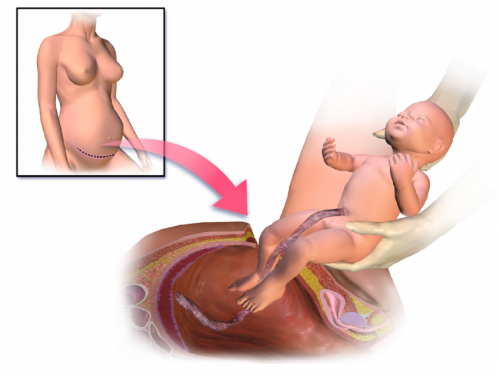Illustration depicting Caesarean section. Credit: BruceBlaus/Wikipedia/CC BY 3.0
Make no mistake: Cesarean deliveries are major surgery. They can save lives, but even so a woman runs the risk of bleeding, infection, a longer and costlier hospital stay—and more cesareans with future pregnancies. But at the Birthplace in the University of Minnesota Masonic Children's Hospital, expectant mothers get care from teams of health professionals who are committed to reducing unnecessary cesareans.
And that's the whole idea. The hospital is one of 21 nationwide in the Reducing Primary Cesareans Project, a quality improvement project of the American College of Nurse-Midwives. Its aim: to reduce the incidence of cesarean births in lower-risk, first-time mothers. Between 2015—during the gearing-up phase—and 2017, the hospital's cesarean rate dropped steadily from 29.3 percent to 25.3 percent.
"In 2018 we hope to reach 23.9 percent, the goal of the national Healthy People 2020 guidelines," says Carrie Neerland, a midwife and an assistant professor in the School of Nursing. She co-leads the project with Becky Gams, an advanced practice clinical nurse leader at the hospital.
Changing a culture
A U of M-led study found that in U.S. hospitals, rates of cesarean births ranged from 7.1 to 69.9 percent. Neerland says this 10-fold variation is thought to reflect differences in practice and hospital culture rather than differences among women. Nationwide, cesareans account for a third of births, she adds.
To counter that statistic, the Birthplace implements new evidence-based guidelines, often incorporating quality-improvement projects by midwifery students in the U of M's Doctor of Nursing Practice (DNP) program. For example, a DNP student developed an early labor lounge, featuring tools such as birth balls and a menu of labor positions to assume in order to increase comfort. Another student developed a guideline for being mobile during labor, using labor slings that can be accessed in any room.
For the long term, "The risk of issues with pregnancy rises with the number of cesareans a woman has," Neerland says. "The health of a family depends on the health of the mother. It's important to avoid cesareans if they're not necessary."
Provided by University of Minnesota





















